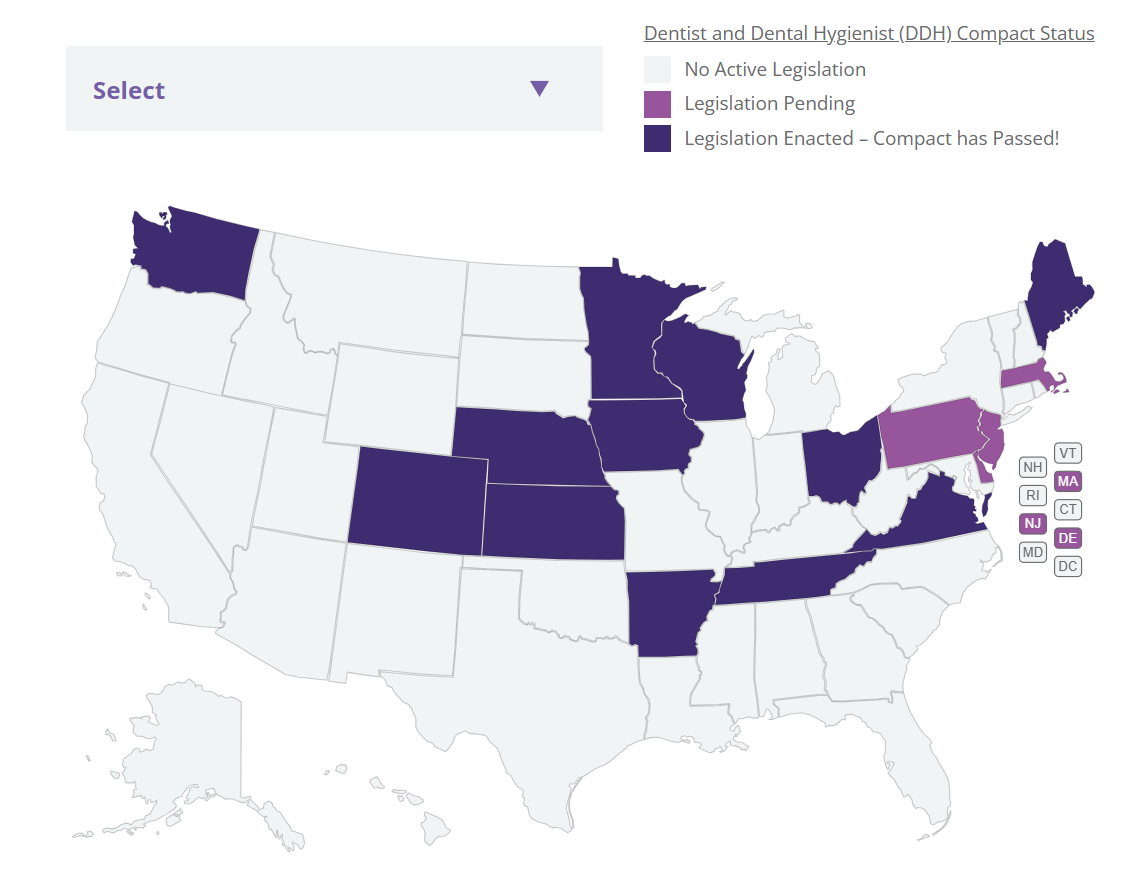Obtaining a license in dental hygiene or dentistry in more than one state has historically been quite challenging, especially for those who live near state borders or need to move to another state.

Kelly Schroeder, MS, RDH
But the American Dental Hygienists’ Association (ADHA) is listening to dental hygienists’ needs for licensure portability and navigating individual state requirements. With grant funding from CareQuest Institute, the organization created an RDH License Renewal Map. The map helps dental hygienists navigate all the complexities of being licensed in one or more states.
Licensure Challenges Across State Lines
For years, dental hygienists, like CareQuest Institute Clinical Content and Education Specialist Stephanie Clester, RDH, MA, had to navigate extreme challenges with getting licensed in additional states. Clester had to retake courses, even though she was an experienced dental hygienist.
“The financial strain of relocating as a dental hygienist is significant,” Clester says. “Not only are clinical board exams costly, often exceeding a few thousand dollars, but they’re offered infrequently, creating long delays. During that time, you’re unable to work in your profession, which compounds the burden with lost income and uncertainty.”
In addition to the initial licensure challenges, the next ongoing issue was managing the continuing education requirements and different licensing renewal processes for each state. Many dentists and dental hygienists must get licensed in another state because of family relocations, military assignments, or other opportunities.
“I’ve been a military spouse for 29 years and am too stubborn to give up my career!” says Shannon Bryant McCharen, RDH. She holds dental hygiene licenses in Texas, Virginia, Wisconsin, Mississippi, and North Carolina.
Moving Toward Interstate Licensure
The Department of Defense recognized the need for dentists and dental hygienists to be able to practice in more than one state. The Department initiated action and collaboration with the American Dental Association (ADA), ADHA, and the Council of State Governments. In November 2020, these entities began working together to create the Dentist and Dental Hygienist Compact, an interstate licensure compact. The compact says a licensed dentist or dental hygienist who graduated from an accredited dental or dental hygiene program and is in good standing no longer has to reapply for a license in a compact state.
Currently, there are 12 states that have passed legislation that will allow dentists and dental hygienists to work in other compact states, including Maine, Ohio, Virginia, Tennessee, Arkansas, Wisconsin, Minnesota, Iowa, Nebraska, Kansas, Colorado, and Washington. States that have legislation pending include Massachusetts, New Jersey, Pennsylvania, Delaware, and Oklahoma. The Dentist and Dental Hygienist Compact has more information about those rules and processes.
This licensure compact also prevents the need for oral health professionals to maintain separate renewal timelines and continuing education requirements to accompany each state license. Dentists and dental hygienists who engage with the licensure compact are only required to keep up the renewal and continuing education requirements for one state. This saves them time and money, as well as the frustration that comes with applying for multiple professional licenses. It also prevents the financial burden that comes with lost wages while waiting for months to obtain a license.
One area that doesn’t change when practicing in a compact state is scope of practice laws. The United States consists of 50 different state statutes with 50 different variations of the scope of practice for dental hygienists. Variations in scope of practice between states can include levels of supervision required from a dentist, providing local anesthetic, dental hygiene diagnosis, and more. Keeping track of these variations can be very challenging.
Navigating the Complexities of Licensure
 To solve the problem of keeping track of which states are compact states, along with each state’s continuing education requirements and scope of practice laws, the ADHA, with funding from CareQuest Institute, created an interactive map that centralizes this information in one location.
To solve the problem of keeping track of which states are compact states, along with each state’s continuing education requirements and scope of practice laws, the ADHA, with funding from CareQuest Institute, created an interactive map that centralizes this information in one location.
The RDH License Renewal Map is a color-coded interactive map that shows the states where licensure compact legislation has been enacted, where legislation is pending, and where there is no active legislation. By hovering over each state, dental professionals can see that state’s renewal cycle. Then, clicking on the state brings up even more details, including continuing education requirements and scope of practice.
This tool can be used by professionals who are seeking to practice in another state or are reactivating their license(s). Many users have said they also plan to share the map with their students to help them navigate the initial licensure process. The map is also supporting a campaign to address the dental hygienist workforce shortage and lack of diversity.
Currently, the ADHA updates the tool about every six months, but will make updates as needed. In the future, the ADHA would like to add more resources to the map, such as average salary by state and the number of dental hygiene programs per state. ADHA and CareQuest Institute are working to support oral health professionals by advocating for expanded scope of practice laws and making it easier to understand individual state requirements. Dentists and dental hygienists can continue to improve their professional experience by sharing their needs with their professional associations.
